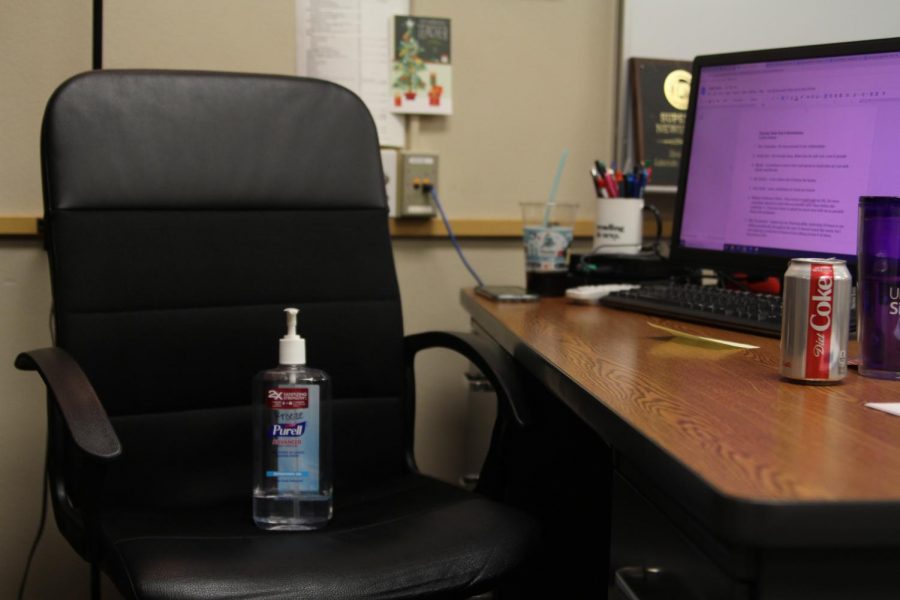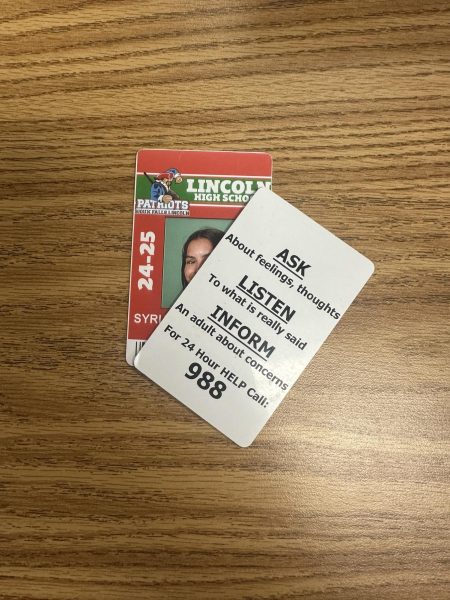Don’t forget to bring your teacher an apple
Teachers lives have been turned around by COVID-19’s changes to school.
Big secret: school is different this year. Students wear masks, socially distance (kind of), face the possibility of being close-contacted, have different looking sports seasons; I needn’t go on. What about teachers? To start, they also face the possibility of having to self quarantine upon exposure, they wear masks and most have extra sanitizer on hand. They have been recording lectures, streaming classes, answering emails, posting notes, assignments, answers; I’m not a teacher and can’t even get close to listing all of their added duties this year. No matter if you’re a student or a teacher, we’ve all had to deal with a little (or a lot) more. As a student, regardless of this year’s changes, the goal still remains the same: go to school, take classes, do the work and pass the class. For teachers, amidst the pandemic or not, student absences greatly disrupt the typical order of a class. It’s not a given that students miss school exclusively due to COVID-19 exposure, but ask any teacher, and it is practically guaranteed that teachers will have multiple students absent because of exposure throughout their day and classes. While student absences are not a new byproduct of COVID-19, the sheer number of absences is. The E-Wing parking lot’s relative emptiness can attest to this.
So, let’s focus on teachers; they’ve had to make their class material accessible and learnable for any students stuck at home. “I spend an extra couple of hours on Sundays at school making sure Google Classroom has hand-written notes, video to match the notes, the assignment and the answer key for each day,” said LHS math teacher Heidi Dykstra.
If you’ve ever taken an AP Physics class, come COVID-19 you may have thought to yourself “Newitt was ready for this all along.” I know I have. However, even “Mr. Newitt’s Webpage” has required changes in these times. “I have tried to create a website that allows students to do everything that we do in class from home if they have to,” said Brad Newitt, LHS AP Physics teacher. “It is taking some tweaking this year to make that all work, but I think I’m getting to a point now where I have a pretty good system in place.”
Most teachers are having to do more work to remedy student absences. One could say “well, it’s their job,” which engages the debate of teacher salaries, a debate that COVID-19, arguably, should only intensify. Given the scope of this article I won’t try to tackle the salary issue, personal beliefs aside, but instead I will ask you, my reader, to try and empathize more deeply with the teachers around you. With all the extra work this year has brought, it has become increasingly clear that for most of them, it’s not just a job.
Administration has not sat idly while the number of close-contactings and positive cases rise; they have hired two extra staff members to aid students in the catching-up process. But these “COVID mentors” can only do so much, leaving plenty still to be done by the teachers. The administration staff, having to deal with balancing student needs and classroom demands, has instructed teachers to approach the situation of absent students case by case and in a way that does not put pressure on students.
“The only guidance we have gotten from administration is that students have as long as they need to catch up. We cannot pressure or stress students out if they come back without work finished,” said Dysktra.
For students unfazed by the pile of work growing daily during a quarantine period, a close contact call from the Department of Health is comparable to winning a free cruise: it’s a one way ticket to a two week “coronacation.” Teachers, however, have gone to great lengths to make sure that absent students can keep up if they are inclined to do so.
“The responsibility is ultimately on the student [to stay caught-up], however, as a teacher I feel like it’s my responsibility to set up a structure that they can be successful in getting caught up when they’ve been gone,” said Newitt.
If it was easy to keep up in school without actually being in school, it seems attendance wouldn’t be mandatory. Whether a student has kept up with work or not, classes aren’t structured to have students miss two weeks or more at a time. This becomes even more difficult in classes that rely on cumulatively-built knowledge for every new lesson, where it’s hard to jump back in.
“While I understand how overwhelming being out of school for two weeks can be for students and their mental health, it is also frustrating when much of my material scaffolds on previously learned material,” said Dysktra. “ I do not know how to balance the administration’s guidelines and my scaffolding issues, so I work really hard to keep my Google Classroom organized so it is easy for students to keep caught up.”
In these issues the problem lies; there is no winning for teachers, students or administration. While some students are able to stay caught up while absent and minimize the detriment of scaffolding issues, students who are not caught up in these circumstances, for whatever reason, are then at a major deficit. There is little teachers can do to prevent these deficits besides putting out resources and accommodations for absent students.
Thanks to the elimination of quarter grades this year, we have yet to see how the increase in student absences will affect the pass rates of classes, but one can already assume. For a student operating at a two week deficit, the amount of work only grows, even upon returning to school. For students that struggle with self discipline this amount of work may seem insurmountable, and result in a lack of effort and potentially the failing of a class, or a significant drop in grades.
Given the current policies, there is not much a teacher can do to prevent this from happening outside of what most are already doing. Should teachers have the ability to set deadlines/requirements for absent students during their absences to proactively try and prevent these situations from developing? On the other hand, teacher and administrative pressure could only worsen a student’s situation and task-completing abilities. Which should we worry about more: a student’s well-being or academic success?
The current teacher instruction automatically favors student well-being, and it is hard to fault administration for doing so. But this approach also gives students the option to fall behind. If teachers were able to set absence expectations, this could be eliminated. This approach, however, could result in students easily becoming overwhelmed. When a student misses two weeks of five to six academically heavy classes, there’s much to make up. Both students and teachers have to find time to make sure the absent student’s understanding is up to par, make up tests, quizzes, labs; the list goes on. There is no doubt this is a mountain of stress for the student, and a scheduling nightmare for the teacher, especially when they have multiple students absent. Not to mention the extra hours of work new to this year.
No-pressure instructions give students the benefit of the doubt (assumes students will keep up to the best of their ability), but potentially leave teachers helpless if students willingly fall behind. This may reflect poorly on teachers; isn’t it easy for a student (who has already been given the benefit of the doubt) to blame their failure on the teacher? Allowing teachers to “pressure” their absent students would give teachers the benefit of the doubt (assumes teachers will set reasonable, case-by-case expectations), but requires students to communicate if they are feeling overwhelmed or stressed, which can seem daunting to students.
In some situations, students don’t need to be pressured to succeed, while in others they do. Either way, it’s not an easy time to be a teacher. So, whether you’ve been gone or in class this whole time, you might want to bring your teacher an apple (or stay caught up to the best of your ability; they’d probably appreciate that more).

Sara Croghan is an Editor-in-Chief for the Statesman and a senior at LHS. When not taking photos and writing stories for the next issue, she plays volleyball...







